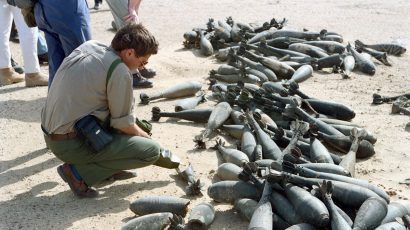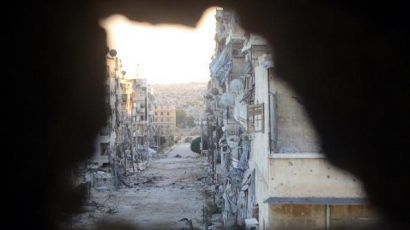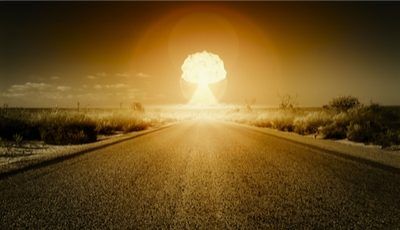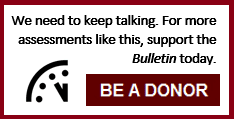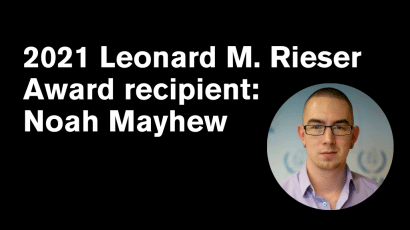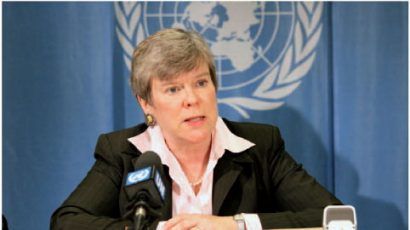Search results for nuclear terrorism
Mexico’s stolen radiation source: It could happen here
The truck-jacking incident in Mexico is a reminder that it’s time for the United States and other countries to get serious about securing dangerous radioactive material.
The war bill
The Menendez-Kirk legislation would push the United States closer to a military confrontation with Iran.
Into thin air: The story of Plutonium Mountain
Former Los Alamos National Laboratory director Siegfried Hecker details one of the world’s great nonproliferation stories—the effort to secure the Semipalatinsk Test Site in Kazakhstan.
Revisiting radioactive source security
The possibility of radioactive material falling into the hands of criminal organizations or terrorists remains a real and persistent security threat. The International Atomic Energy Agency (IAEA) reports that, since 1993, there have been more than 2,000 confirmed incidents of lost regulatory control over potentially dangerous material, including nearly 150 incidents last year.
The costs of war
Military responses to problems have a way of creating all sorts of new problems. The tenth anniversary of the 9/11 tragedy offers an opportunity to reflect on the costs and benefits of the wars the United States initiated against Iraq and Afghanistan after the terrorist attacks. A comprehensive new study, "Costs of War," sponsored by Brown University (and with which I have been affiliated) suggests that the costs have been wildly out of proportion to the benefits.
Rising water, falling journalism
Every evening, my father climbs the levee along the Missouri River in Council Bluffs, Iowa, and peers down into the black water that swallows the road. The water is rising, and the Army Corps of Engineers says the levee has never faced such a test. Dad, a retired professor, is packing his books and papers. If the levee doesn't hold, his one-story house could be underwater for months.
Obama’s test: Bringing order to the national security policy process
During the Bush administration, funding for the Defense Department, State Department, and Department of Homeland Security more or less doubled. But in all three cases, the goal of the budget increases wasn't to create functioning, efficient, and effective bureaucracies. Instead, it was to push a political agenda--at the cost of effective management. As a result, all three departments emerge from the last eight years less focused, less disciplined, and less effective.
Establishing the next president’s national security agenda: Part I
With the presidential primaries ending this week, it's time to focus on the general election and the key national security challenges that the next president will face. Over the next three columns, I will outline what national security issues I think the candidates should be debating.
The true cost of U.S. defense spending
With the likelihood of significant political change in January 2009, the Pentagon has been thinking a lot about next year's defense budget request (fiscal year 2010), which the new president will inherit when it's sent to Congress in February 2009. Budget planners and senior leaders in the Defense Department and armed forces face four possible options:
The many lessons to be drawn from the search for Iraqi WMD
After the Gulf War, Terence Taylor served on the UN Special Commission investigating weapons of mass destruction programs in the country. Technical expertise in weapons inspections, an understanding of global trade, and a knack for the element of surprise helped Taylor and other weapons inspectors discover, among other things, the existence of Iraq’s biological weapons program.
The slow death of nonproliferation norms
The global stigma against using chemical weapons is weakening. That’s alarming—but not as alarming as the broader breakdown of nonproliferation norms that may be in the offing.
Who would destroy the world?
Studies of existential risk often focus on technologies that could destroy the world, rather than on the people who might use these technologies.
Is the West prepared for an Islamic State attack?
Much has been written about Islamic State acquiring weapons of mass destruction, but more attention should be paid to how well Western nations are actually prepared for an attack.
A message from Tripoli, Part 2: How Libya gave up its WMD
Second installment of a series on on how Libya was persuaded to relinquish its weapons of mass destruction
What worries risk experts most? (Hint: It’s not what keeps Clinton and Trump up at night)
Risk experts identify the five biggest threats to the world—but the presidential candidates are focused on smaller issues.
70 years of speaking knowledge to power
An adaptation of an address by Lawrence M. Krauss at the Bulletin of the Atomic Scientists' 70th anniversary dinner in Chicago
Bulletin names Noah Mayhew 2021 Leonard M. Rieser Award recipient
Noah Mayhew, a research associate at the Vienna Center for Disarmament and Non-Proliferation, was selected as the 2021 recipient of the Bulletin’s Leonard M. Rieser award. Mayhew, who focuses on nuclear arms control and IAEA safeguards, was selected for his July 8, 2021, article “A millennial’s view: ICBMs are ridiculous.” “Noah Mayhew’s piece brings a … Continued
How a deliberate pandemic could crush societies and what to do about it
Terrorists or other nefarious people or groups could soon have the know-how to deliberately spark a pandemic. The consequences might be even more dire than a pandemic that sprung naturally from a single location.

